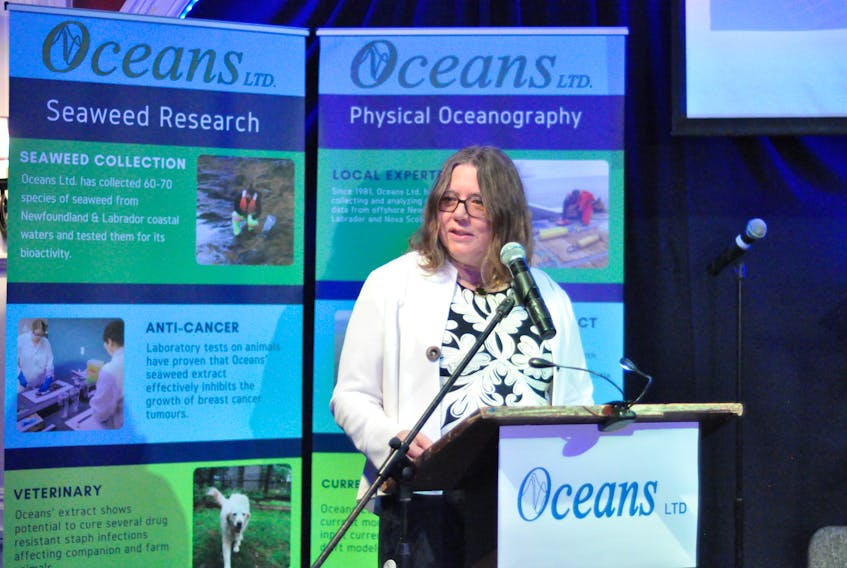Over the past 37 years, Oceans Ltd. has built its reputation on services provided to the oil and gas industry, but research into therapeutic bioactivity benefits of seaweed could put them on the map for another reason.
On Wednesday, president and CEO Judith Bobbitt announced a potentially ground-breaking discovery in a particular type of seaweed found along the province’s coast that has anti-cancer properties, specifically against breast cancer tumours.
“It could mean that in the future we’ll have a drug that doesn’t have the side effects of chemotherapy, and it works different,” says Bobbitt. “The cancer cells won’t multiply, won’t expand, and your immune system should take care of it.”
Bobbitt and Oceans were inspired to investigate the biological activity of seaweed as a result of research by Dr. Sarah Sallon, head of the Natural Medicine Unit of Hadassag Medical Centre in Israel, who was interested in wound healing and was working with various types of plants.
“But instead of just wound healing, I decided to be broader and look for anti-microbial, anti-ageing, anti-cancer, radio-protective. I was going across the whole spectrum to look for medical effects.”
Oceans Ltd. sampled between 60 and 70 species and it turned up a lot of potentials, but Bobbitt and her team decided to narrow their focus to the anti-cancer and anti-microbial benefits.
Following successful in-vitro studies, in-vivo trials using a crude extract on mice resulted in inhibited growth of breast cancer cells. From there, Oceans Ltd. personnel isolated and identified the molecular structure, and it resulted in the discovery a new novel molecule, which is an active, complex molecule that has not been approved by regulators.
They then had to figure out if the previously identified bioactivity was found in the new molecule, which has been dubbed GordonaDosi, Greek for mermaid potion.
“When it came in we were overjoyed,” says Bobbitt. “Not only had we discovered a new molecule from the ocean, but that molecule had the properties to stop the growth of breast cancer.”
It also has the potential to treat prostate cancer, but they can’t make that claim, since it hasn’t been specifically been tested in-vivo.
Unlike with chemotherapy and other cancer treatment drugs, there appear to be no negative side effects. The mice used in the study showed no weight loss and there were no obvious abnormalities related to distant tumour metastasis in other organs.
But Bobbitt pointed out that long-term studies have yet to take place, and they plan to initiate those once the molecule is synthesized at a lab in Montreal.
After safety trials, they can move into the first phase of human trials, which she hopes to begin in a year.
“We have to do it on humans because we don’t know the concentration and we don’t know how long we have to treat them,” she says.
Only then, Bobbitt says, will they begin to seek a partner in the form of a pharmaceutical company to produce the drug and get it out to the public.
Asked if Oceans would seek a company that wouldn’t solely look to profit from the production and sale of a drug treating a disease affecting one in eight Canadian women during their lifetime, Bobbitt said that won’t be issue because the extensive and expensive research and studies are already done.
“We have the methodology worked out. There’s not much for them to do anymore, so they can’t really put a huge cost on it,” Bobbitt said.
To this point, none of the research has published, nor has it undergone any sort of peer review, and Bobbitt says there are no plans to seek out an objective study.
“We’ve gone through very prominent labs to do all this and the structure of the molecule will one day be published,” she says, indicating a National Research Council lab in P.E.I. was used for the animal testing, and Nova Scotia’s was used for identifying the molecular structure.
“We haven’t published anything because we’re looking at more protection with patenting everything first.”
To date, Bobbitt says, the small company has invested “a few million” dollars into the research, all without the benefit of any funding from the Canadian Cancer Society or other cancer-based charities, as they are not allowed under federal laws to fund private-sector companies, only academic institutions and hospitals.
As members of the successful Ocean Supercluster pitch, Oceans Ltd. hopes to avail of some of the $150 million to $250 million being made available by the federal government.
Twitter: kennoliver79









